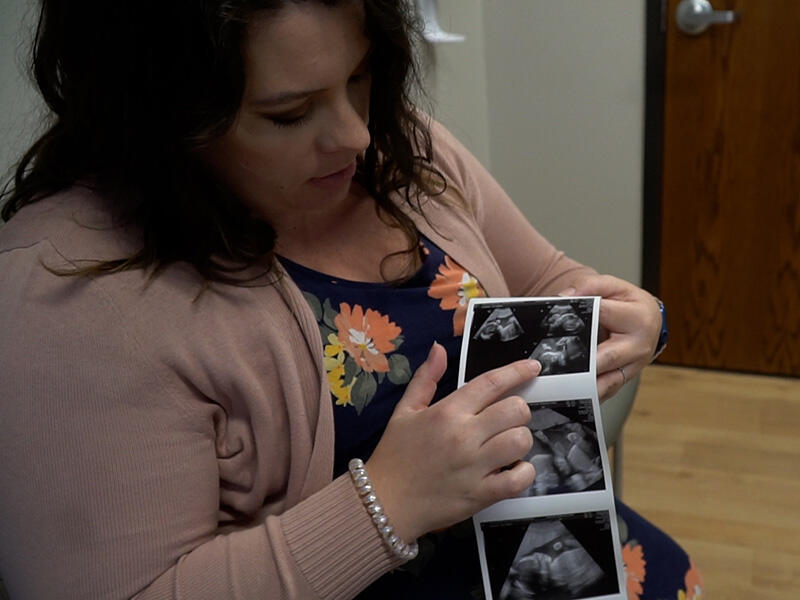Heather Muscha Metcalf says she enjoys being pregnant. After all, she’s done this four times in the past.
“I have two of my own, but I was also a surrogate twice. So I’ve carried four babies,” said Muscha Metcalf. “This was my fifth pregnancy.”
But this one is far different from the rest.
‘A huge shock’
Muscha Metcalf is pregnant with identical triplets, something that occurs naturally in just one out of every 100,000 pregnancies that do not involve fertility treatments. When she and her husband got the news, it was a shock to say the least.
“I just expected one heartbeat because that’s every other appointment I’ve ever gone for,” said Muscha Metcalf. “And then they showed all three babies and, I mean, I couldn’t stop talking. I was like nervous talking, and my husband was very calm and quiet.”
When she found out the triplets all came from the same egg, meaning they were identical, the surprise was even greater.
“Now I have to worry about mixing ’em up and there’s three,” Muscha Metcalf said with a laugh. “So it was definitely a huge shock.”
Specialized care at Sanford
Ana Tobiasz, M.D., is a maternal-fetal medicine specialist at Sanford Bismarck, and the only doctor in the western half of North Dakota who can provide Muscha Metcalf and her triplets with the specialized prenatal care they need. They have an appointment every two weeks.
“Heather has a very high risk pregnancy,” said Dr. Tobiasz. “These type of triplets share a placenta, which means that they share a blood supply. So part of the reason they’re so high risk is that there can be uneven sharing of blood and that can result in severe complications for one or all of them where one of them will have too little blood, the others will have too much blood.”
In fact, there were already complications in this pregnancy. At one point, Muscha Metcalf was actually carrying quadruplets, but something called Vanishing Twin Syndrome caused the fraternal fourth baby to be absorbed by the triplets.
“There’s just a lot more stuff that I never considered being an issue in a pregnancy, because mine have all been very uneventful, easygoing pregnancies (in the past),” said Muscha Metcalf.
This pregnancy has not been easy. Multiple gestations tax the body a lot more than a typical pregnancy.
“Your heart is working harder, your breathing has changed. So it’s just more difficult to be active and get around. So it’s really important that people have care close to home so they’re not having to travel four, five, six hours for that care,” said Dr. Tobiasz.
“Day-to-day tasks are really hard. And even now, I mean, I can walk around the kitchen and be winded and need to sit down and take a break and that’s not normal for me. I’m used to being able to keep up with my kids,” said Muscha Metcalf.
Excitement runs in the family
Her family is full of anticipation for three baby girls to arrive. Her sons, Teddy and Henry, are 11 and 9 years old respectively, and they’re ready for some added responsibility.
“They are so excited, especially Teddy,” said Muscha Metcalf. “He’s like, ‘I get a baby and Henry gets a baby and then there’s a baby for you, Mom!’ So they just assume that we can just hold a baby all the time. They both have been asking for a baby sister for a while and now they each get their own to choose from because we got spares!”
Dr. Tobiasz expects Muscha Metcalf to deliver her babies prematurely. Most come around the 32-week mark, so the newborn girls will likely spend their first two months of life in the NICU. But with the help of Sanford and Dr. Tobiasz during the pregnancy, Muscha Metcalf’s family is set to grow very quickly.
“I know they’re there, but half the time I can’t believe there are three,” said Muscha Metcalf. “I know the end goal and I’m excited, but it’s definitely a very exhausting experience.”
Learn more
- Mother of triplets quits smoking for her babies and herself
- Podcast: Choosing a hospital for labor and delivery
- Mom’s dream of big family comes true with quintuplets
…
Posted In Bismarck, Pregnancy, Specialty Care, Women's

